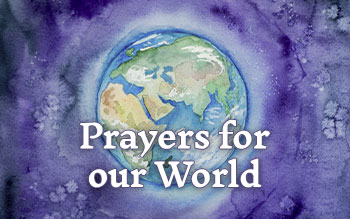Displaying items by tag: Asia
Aasia Bibi out of prison but not yet safe?
Pakistani Christian mother Aasia Bibi has finally been freed from prison after spending over eight years on death row for allegedly committing ‘blasphemy’ against Islam, but she is not yet free. Government officials confirmed on 8 November that she had been flown to Islamabad under tight security due to radical Muslim death threats against her and her family following the news of her acquittal. While some reports stated that she had left the country, a foreign ministry spokesman said that this was not true. It is unclear what might happen to her, given that Imran Khan’s government has seemingly given way to the huge protests caused by her acquittal on 31 October, and made a deal with the party responsible for organising them. According to that agreement, Aasia would be re-tried by a new supreme court, not including the original three judges.
Pakistan: serving 'poorest of the poor' for 150 years
An eye surgeon from the Diocese of Peshawar, Khushbakht Peters, celebrates the work of the Christian hospital at Tank in the Khyber Pakhtunkhwa. She writes: ‘Tank is a city in the south of our province. The war against terrorism has been going on for a long time here; many people, both soldiers and civilians, have lost their lives. Yet even when things were at their worst, the dedicated staff at the Christian Hospital persisted in providing healthcare services. A few years ago, even the Taliban refused to attack the hospital, as this is where all their women and children go for treatment. For the past 150 years the hospital has been following the footsteps of the Good Samaritan, providing a healing touch for those in need. They have been helping the poorest of the poor, the underprivileged of society, giving them their only chance to better health. Following the living example of the hospital, let us be obedient to our calling to the Lord, and become a blessing for many.’
Saudi officials tried to remove evidence
Members of a Saudi Arabian team sent to help Turkish authorities investigate the killing of journalist Jamal Khashoggi worked instead to remove evidence. A Turkish government spokesman said that two members of the team ‘came for the sole purpose of covering up evidence’ before Turkish police were allowed to search the Saudi consulate, where Khashoggi was killed on 2 October. The fact that a clean-up team was dispatched suggests that his killing ‘was within the knowledge of top Saudi officials’. The information was the latest in a series of leaks from Turkish officials apparently aimed at keeping up the pressure on Saudi Arabia and ensuring that the killing is not covered up. Khashoggi, who lived in exile in the United States, was strangled immediately after he entered the consulate, and his body was dismembered before being removed.
Iraq: IS left many mass graves
A UN investigation has found more than 200 mass graves in areas of Iraq once controlled by the Islamic State (IS) group. IS seized parts of Iraq in 2014 and imposed brutal rule, commonly killing anyone of whom it disapproved. The sites contain critical evidence that will not only identify the victims but also help prosecutors build cases for war crimes, crimes against humanity, and possibly genocide. Investigators estimate that between six and twelve thousand victims are buried at the sites, including women, children, the elderly, people with disabilities, foreign workers, and members of the Iraqi security forces. Ján Kubiš, the UN special representative for Iraq, said, ‘The mass grave sites are a testament to harrowing human loss, profound suffering and shocking cruelty. (Analysing the evidence) will be an important step in the mourning process for families and their journey to secure their rights to truth and justice.’
China denies Uyghur detention camps
Western nations including the USA, France, and Germany have called on China to close down detention camps in the western region of Xinjiang which activists claim hold as many as one million Uyghurs and other Muslims. China, however, has described these criticisms as ‘seriously far away from facts’. Its vice minister of foreign affairs, Le Yucheng, told UNHCR in Geneva that his country protects the freedoms of its 55 ethnic minorities. China has said Xinjiang faces a threat from Islamist militants and separatists, and rejects all accusations of mistreatment and denies mass internment, although it states that some citizens guilty of minor offences are being sent to vocational centres to work. Mr Le, referring to Xinjiang, said: ‘Stability is most important, prevention should be put first. Setting up the training centres is a preventative measure to combat terrorism.’
India: nuclear submarine’s first voyage
Prime minister Narendra Modi says the first successful voyage by India’s home-built nuclear submarine is a ‘warning for the country's enemies’. The INS Arihant recently completed a month-long ‘deterrence patrol’, meaning India now has the capability to fire nuclear weapons from land, air and sea. Mr Modi, a Hindu nationalist, tweeted it was a ‘fitting response to those who indulge in nuclear blackmail’. In a speech televised nationwide, he told the submarine’s crew, ‘Amid an increase in the number of nuclear weapons in our surroundings, a credible nuclear deterrence is extremely important for our country's security’. His words are a thinly-veiled reference to India's neighbours, China to its north and its traditional enemy, Pakistan, to the west. The often volatile relationship with Pakistan has cooled even more noticeably since Mr Modi took office in 2017 and adopted a more assertive strategy towards its arch-rival.
Yemen: vision of ceasefire
Pentagon chief James Mattis said the US had been watching the conflict ‘for long enough’, and believes Saudi Arabia and the United Arab Emirates are ready for talks. The comments came as the military coalition deployed over 10,000 new troops towards a vital rebel-held port city in the run-up to a new assault. Mattis said, ‘We have got to move toward a peace effort here, and we can't say we are going to do it sometime in the future. We need to be doing this in the next thirty days.’ His comments came at the US Institute of Peace, whose president, Kevin Martin, said that the Yemen needs peace right now, and even thirty days to halt fighting is too long. He added, ‘I think the Trump administration is trying to get out ahead of a stampede. Congress, public opinion and the media have all turned very much against this war.’ See also the UK article ‘Boris Johnson and the Saudis’.
Indonesia: cause of plane crash not yet known
Indonesia has ordered inspections on all its commercial Boeing 737-Max 8 planes, after one crashed into the sea minutes after taking off from Jakarta, with 189 people on board, on 29 October. There are no known survivors. Searchers have recovered debris, bodies and personal items. The flight recorder (‘black box’) has now been located, which may shed light on the mystery of why it crashed, considering that it was almost brand-new. It seems that the pilot asked to return to Jakarta airport before losing contact with air traffic control. A log obtained by the BBC showed the plane had experienced technical problems on the previous day. Indonesia, a vast archipelago, is heavily reliant on air travel but many of its airlines have a poor safety record.
Pray for Pakistan: Asia Bibi acquitted
Asia Bibi, a young mother of five who has spent 8 years behind bars unjustly accused of blasphemy against Muhammad by Muslim neighbors, has now been finally acquitted by Pakistan's Supreme Court of the charges against her. Friends who monitor the situation there now write:
"This is indeed good news, but now Asia Bibi, her whole family and the whole Christian community need much prayer cover, indeed anyone involved in this case, the judges, the lawyers, also the government. Several groups have already sworn to take revenge on the Christian community. One of our team members in Lahore was visiting family across the city because of a death in her family. She is caught there and cannot return as there are threats of riots and people have been told to stay inside their houses."
Another ministry leader who has spent his life working in that region wrote: "This is an important time to pray for Pakistan for different reasons. Now the Christian community is in danger of getting attacked and the extremists want to see revenge, but we should also pray that the government would back up the decision of the Supreme Court. This was a very encouraging and courageous ruling. There are many others still in prison for the same wrong charges."
- Please pray that the police and authorities will be able to keep control of this situation and stop any rioting by the Islamic extremists of which there are many who will be very angry about this ruling.
- Pray that this court decision will not result in bloodshed which is always possible in this spiritual dark, majority Muslim country.
- Pray that the blasphemy law which enables such false accusations, often attended by terrible violence against the Christians, will be rescinded and others who have been imprisoned unjustly will be acquitted and released.
- Pray for His peace to settle over this land, for the protection and empowering of the Christian community, and that the oppressive spiritual bondage will be broken over Pakistan so that many of the majority will come to Christ.
More info: https://www.bbc.com/news/world-asia-46040515
Persecution in China intensifies
“Earlier this year we sent out a newsletter entitled "A Special China Issue," which told of the massive and brutal persecution of Christians underway in China. Many people were shocked by what we shared, and some even doubted if it was true, as other sources weren't reporting the trouble.
In the following months it became clear that God's people in China are not merely going through a regular season of hardship, but a major effort is underway to completely control the Church, backed by new technology that creates challenges to the Body of Christ that have never been encountered before. In this newsletter we will update you on the crisis in China, while attempting to answer some of the common questions people have asked.
What's the Latest News from China?
In recent months the government has markedly increased the pressure on Christians throughout the country. We received an unconfirmed report from a long-term China missionary stating that 314 house church Christians have been killed in recent months, and hundreds more are missing. Most house church leaders have gone into hiding and have disconnected their phones and other devices because of the incredible surveillance capabilities of the state.
Thousands of house churches (which are considered illegal in China) have been closed. Reflecting the actions of Mao's Red Guards in the 1960s, religious symbols such as crosses and Scripture posters have been torn down and replaced by flags of China or portraits of President Xi Jinping.
Note: Our website version of this newsletter includes several important links to articles and videos to help people understand what's going on in China and how best to pray. Please visit www.asiaharvest.org for more detailed information.
Links to articles:
Updated: Large Beijing house church banned as China continues Christian persecution
Inmates initiate hunger strike amid mass incarceration crackdown
China Uighurs: Xinjiang legalises 're-education' camps
Leave no dark corner
Some congregations have been ordered to sing the national anthem or other patriotic songs at the start of their services. Others have been ordered to install government facial-recognition surveillance cameras inside their worship halls, and those that have refused to comply have been forced to shut down.
Landlords who rent buildings to Christians are being heavily fined by the government, with new laws allowing fines of between 20,000 to 200,000 Yuan (almost US$30,000). This has created a climate of fear and suspicion, and thousands of fellowships have been forced out of the premises they were renting. On the streets, the police have the power to stop and search anyone they wish and to check their phones and other devices for content they deem a threat to society. These threats may include the presence of a Bible app or visits to Christian websites, or any communication considered unpatriotic.
The most severe persecution is occurring in the vast Xinjiang region in northwest China. In recent years a promising church movement had emerged among the Uyghur, Kazakh and Kirghiz people groups, but most of the church leaders have been arrested and taken to concentration camps in the desert. Reputable news organizations estimate at least one million people are being detained and tortured in those camps right now. Many suburbs in cities like Urumqi, Hami and Kashgar are now depopulated and countless buildings have been boarded up. Although this initiative was designed to target Muslims in border areas, almost all Uygur and Kazakh church leaders have also been taken away. The government doesn't care whether someone is a Muslim or Christian. It's all the same to them.
Spiritual Forces Behind the Persecution
While there are human reasons for the dramatic persecution, we should never lose sight of the fact that Satan and his fallen hosts hate God's people, and they never rest in trying to destroy them. We recently updated our Christian stats for all 2,866 cities and counties in China, and the end result was a marked increase since the last time we reviewed our figures. Currently, we estimate a total of 129.7 million professing Christians in China, of which 109 million are Evangelical believers. The Chinese government is fully aware of the explosive growth of the Church in China, and they are determined to stop it. They don't want China taking over from South Korea as the number one Evangelical country in Asia.
Political Ambitions
If you have read our Asia Harvest newsletters for some time you will know we don't usually mention politics at all, as our call is to equip the Church in Asia and not to be entangled by civilian affairs (2 Timothy 2:4). Our goal is not to favor one political system over another, but to see all people groups of Asia hear the Gospel of Jesus Christ. If one quote sums up what we think about politics, it would be this famous one from an economist in the last century: "Under Communism man oppresses man. Under capitalism it's the other way around."
To understand the human reasons of why China is so determined to destroy the Church, however, it's helpful to grasp the historical background behind China's geopolitical ambitions. Starting in the 1800s, China was dominated by foreign powers that carved up various parts of the country and exploited their natural resources. The Chinese consider this the darkest period in their history, and have labelled it "The century of humiliation." Chinese resentment and desire to revenge their "loss of face" runs deep. Japan was one of the foreign nations that dominated China during this period, inflicting shameful cruelties on the Chinese people. A few years ago a survey in China found that 82 percent of respondents said China should launch a war with Japan before the end of this decade.
 In a bid to try to erase the painful memories of the past, China believes they have an opportunity to be the new world super-power, replacing the United States and the West. To achieve this lofty goal, President Xi Jinping has stopped at nothing to implement his "One Belt, One Road" initiative, which would result in China having the most powerful economy and military on earth. To help him succeed, earlier this year Xi was appointed ‘President for life'. Whereas often in the West we think in terms of months and years, the Chinese think in terms of decades and even centuries. They are not in a rush, and are determined to gradually work their way toward becoming the undisputed world power.
In a bid to try to erase the painful memories of the past, China believes they have an opportunity to be the new world super-power, replacing the United States and the West. To achieve this lofty goal, President Xi Jinping has stopped at nothing to implement his "One Belt, One Road" initiative, which would result in China having the most powerful economy and military on earth. To help him succeed, earlier this year Xi was appointed ‘President for life'. Whereas often in the West we think in terms of months and years, the Chinese think in terms of decades and even centuries. They are not in a rush, and are determined to gradually work their way toward becoming the undisputed world power.
The Communist leaders trying so desperately to implement their global vision are God-hating atheists, and they are determined not to let anyone or anything stand in their way. They want absolute power over what people do, say and think, and Christians, Muslims, or anyone else who may pose a threat to their goals are being subdued, controlled, or eradicated. These are the reasons behind the current campaign to wipe out the Church in China. Mao tried to do this from the 1950s to 1970s, and Xi Jinping seems determined to finish the job that Mao failed to do….
Read the PDF Version of this Newsletter
Let’s continue to pray for a change of policy by the Chinese government that will permit religious freedom. Pray for the encouragement and strengthening of our brothers and sisters in Christ and that the Lord will use the persecution of His people to greatly expand the ministry of the Church and the turning to Christ even more huge numbers of this most populous nation.









